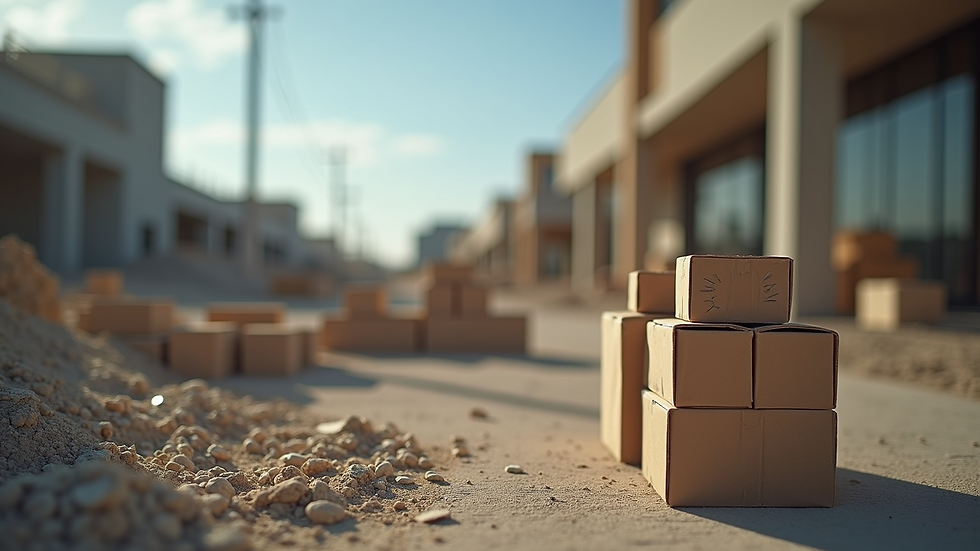How to Choose the Right Construction Supplies for Your Project
- easternbuildingsup
- Jul 5, 2025
- 4 min read
Choosing the right construction supplies for your project can significantly impact the quality, speed, and cost of your work. Whether you’re building a small shed or a multi-story building, having the right materials and tools at your disposal is crucial. In this blog post, we will discuss various factors to consider when selecting construction supplies, along with some practical tips to guide you through the process.
Understanding Construction Supplies
Construction supplies encompass a wide range of materials and tools necessary for building projects. This includes everything from lumber and concrete to hand tools and safety gear. Understanding what types of supplies you need is the first step toward a successful project.
Selecting Essential Materials
The materials you choose should be suited to the specific needs of your project. Here are some common types of construction supplies:
Lumber: Ideal for framing and other structural applications. Make sure to select the appropriate grade based on your project's requirements.
Concrete: Used for foundations, walls, and patios. Consider using ready-mix concrete for convenience.
Steel: Required for structural support, especially in commercial buildings. Look for high-grade steel that meets safety standards.

Factors to Consider When Choosing Construction Supplies
When you are ready to select your construction supplies, several factors should guide your decisions.
Budget Constraints
Setting a budget is essential in any construction project. Before making purchases, estimate the total costs including materials, tools, and labor.
Cost-Effective Options: Look for bulk buying options that can save you money. For example, buying a whole pallet of bricks could reduce the price per unit.
Quality vs. Cost: Always balance quality and price. Sometimes it is worth spending more upfront for high-quality materials that will last longer and require less maintenance.
Project Requirements
The specific requirements of your project may dictate what materials and tools you will need.
Building Codes and Regulations: Make sure to check local building codes. Using materials that don’t meet these codes could lead to significant delays or fines.
Weather Considerations: If your project is outdoors, consider the climate in your area. Some materials fare better in humid or dry conditions.

Supplier Reliability
Choosing the right supplier can make a big difference in your project’s success. You want a supplier that is reliable and can provide quality materials on time.
Research Suppliers: Look for reviews and ratings online. A reputable supplier should have positive feedback from previous customers.
Visit Local Stores: Sometimes seeing the materials in person can give you a better understanding of their quality. For those looking for a convenient option, searching for a construction supply store near me will yield nearby options.
Tools and Equipment
Selecting the right tools and equipment is just as critical as choosing the right materials.
Types of Tools
Here are some essential tools that you may need for your project:
Power Tools: These include drills, saws, and sanders. Power tools can speed up your project significantly.
Hand Tools: Don’t forget the basics like hammers, screwdrivers, and pliers. These are often needed for smaller tasks.
Safety Equipment: Safety gear like helmets, goggles, and gloves should not be overlooked. Ensuring safety on site is a top priority.
Tool Quality
Invest in high-quality tools that will last. While cheaper options may save you money upfront, they can break easily and lead to increased project costs in the long run.

Organizing Your Supplies
Once you've selected your supplies, organizing them effectively can save time and reduce headaches during your project.
Inventory Management
Keep an inventory list of all your supplies. This can help you track what you have and what needs to be purchased.
Labeling: Clearly label the storage areas for various supplies. This can make it easier for your team to find what they need quickly, minimizing downtime.
Storage Solutions
Consider using storage bins or shelving units to keep your supplies organized. Having an orderly workspace enhances productivity and prevents loss or damage to materials.
Sustainability Considerations
In today’s world, many homeowners and contractors are leaning towards sustainable options for construction projects. It’s vital to consider the environmental impact of your chosen supplies.
Eco-Friendly Materials
Look for materials that are reclaimed or recycled, as well as those that are sustainably sourced. For example, bamboo is an excellent sustainable alternative for flooring and other applications.
Energy-Efficient Tools
Also, consider using energy-efficient tools and equipment. Not only could this save you money on operating costs, but it’s better for the environment.
Making the Final Decision
After evaluating all the factors mentioned, you should be closer to making your final decisions on construction supplies. Here are some actionable steps to follow:
Get Quotes: Contact multiple suppliers to get quotes. This will ensure you are getting the best price for the quality you need.
Compare and Contrast: Don’t just go with the cheapest option. Compare materials and their associated costs attentively before committing.
Ask for Advice: If you're unsure, don’t hesitate to ask industry professionals for their opinions. Experienced builders can provide valuable insight that can help you make more informed choices.
By taking the time to carefully select your construction supplies, you can ensure the success of your project and achieve the results you envision. Happy building!




Comments